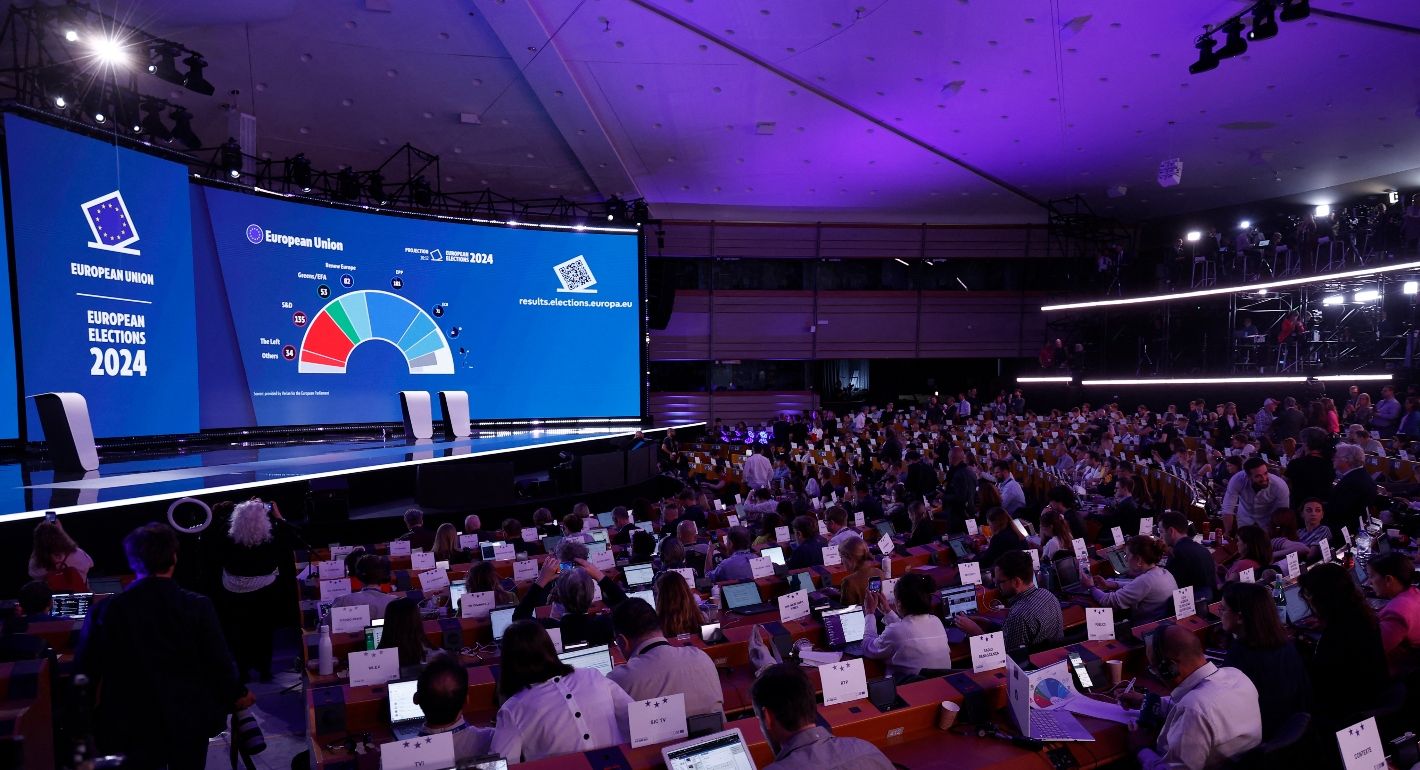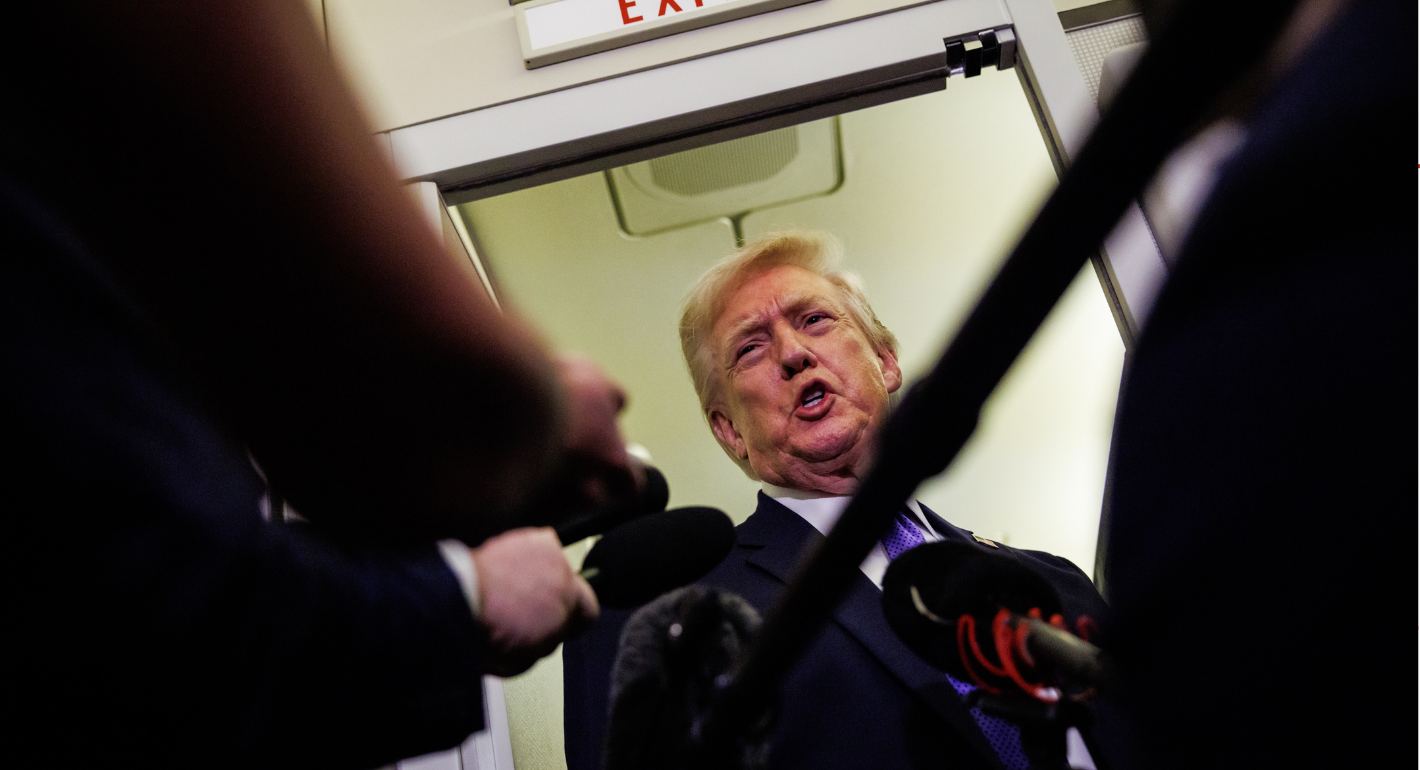The dominant, epoch-making European storyline is now clear: the rise of the far right threatens the EU’s future and democracy. This standard view is expressed in countless opinion pieces and political speeches and is now reshaping both national and EU-level politics. Even if the far right did not surge quite as dramatically as widely predicted in either the European Parliament or the French parliamentary elections, its growing popularity clearly represents a pressing challenge both at the EU level and in national politics.
However, the continent’s predicament might be more accurately described as a more subtle and complex conundrum: in the immediate short term, what is good for the EU integration project might not be good for democracy, and vice versa. The EU and national governments have been struggling with this democracy catch-22 for several years now, and the election results make it an even sharper challenge.
The postelection context has been dominated by the debate over whether to engage or isolate the far right—a debate that has been exhaustively covered and unfolding for many years. Yet, the empirical record suggests that neither engaging with the far right nor ostracizing it has worked especially well. Instead, a third approach might help map a way out of the democracy catch-22: a European democracy pact.
Repeat Strategies
In the EU’s fraught postelection maneuvering, many mainstream parties are set largely to follow a familiar script of banding together to contain the new far-right surge. The standard op-eds, articles, and political speeches now advocate more stringent isolation of the far right. This was of course the dominant debate around France’s snap parliamentary election. And at the EU level, despite shifts in public voting patterns and in the European Parliament arithmetic, a familiar coalition of the main center-right, center-left, and centrist parties will continue. Politicians’ priority in ensuring this continuity is to safeguard key areas of cooperation against more EU-critical positions.
Seeking to protect important EU policy initiatives in this way may be a justified imperative, but the implications for democratic pluralism are not entirely benign. The strategy doubles down on long-standing coalition building aimed at minimizing the influence of EU-critical parties. The risk is that this approach constricts ideological debate and does little to address the underlying reasons why far-right parties are gaining support. Indeed, it is a strategy that almost willfully eschews any fundamental rethink by mainstream pro-EU parties.
At the same time, the opposing stance has also gained pertinence. Some parts of the center right have raised the prospect of at least ad hoc cooperation with some parts of the far right. This strategy involves the European polity showing a greater degree of democratic adaptation, probably to the detriment of EU cooperation. Some back this strategy with a claim that the closer the far right gets to having to find practical policy solutions, the more its allure will fade. Yet, the “let them govern” line underplays how much damage the far right might do to both democracy and the EU before its appeal begins to wane—if, indeed, it does.
A more indirect version of this line focuses not so much on engaging far-right parties but on finding ways to include more citizen participation in EU policies. This stance holds that the engage-versus-isolate binary can be softened by more inclusive forms of citizen engagement. The logic runs that allowing citizens to deliberate and feel they have influence will take away their incentive to vote far right—eventually dissolving the tension between deeper democracy and deeper EU integration. This is an intuitive and convincing approach, but at best it can work over the very long term. The desired results for now look quite uncertain: many countries have tried innovative forms of democratic deliberation, yet their far-right parties have continued to surge.
Hence the democracy catch-22 facing European governments: either show democratic responsiveness and risk short-term damage to the EU or double down on political orthodoxy and risk dampening pluralism. On one side is the danger of incremental de-democratization; on the other is the specter of managerial executive aggrandizement. Bend one way and the EU risks normalizing far-right positions; bend the other way and it frames everything as a battle against the far right in a way that saps democracy’s open-ended pluralism.
A Different Approach
A better way out of the catch-22 would be a European democracy pact. Rather than simply repeat how bad the far-right surge is for the EU, this approach would attempt to engage radical parties expressly to gain their commitment to core democratic values.
Such a pact would constitute a different way forward by separating policy debates from political-system issues. The focus on setting democracy redlines would not necessarily entail or require engagement with the far right on particular policy issues. Instead, it would seek consensus on democracy separately from the parties’ policy preferences in specific areas of EU cooperation. The pact would not represent positive engagement that normalizes policy illiberalism but would serve as leverage to protect political-system liberalism.
This focus on democracy is desperately needed. Most attention has been on the far right’s challenge to EU integration; this is evident in center-right talks with the likes of Italian Prime Minister Giorgia Meloni. On this matter, some analysts stress the softening of far-right Euroskepticism, while others fear that many have not appreciated the degree of the far right’s discriminatory nationalism and illiberalism. Whatever the correct judgment on this, debates have undoubtedly eclipsed a more systemic concern with democracy. Governments are once again intent mainly on negotiating for their own national representatives in key positions rather than thinking in terms of European democracy. It is striking how far debates about EU far-right politics are divorced from the world of debates about index measurements of democratic quality.
Yet, a strategy is needed specifically to address fears that far-right parties are not just illiberal and reactionary in their policy prescriptions but also likely to show themselves to be increasingly undemocratic. A European democracy pact would invite far-right parties to live up to their claims to be fully democratic and put them to the test on core values of political pluralism.
The pact should not merely list generic principles or replicate existing EU treaty provisions in a way that has no operational relevance. Rather, it should be concrete and detailed enough to hold parties meaningfully to account. The pact should include injunctions against the kinds of subtle democratic erosion that have proliferated in recent years. For example, it should include commitments not to challenge the equality of citizenship rights, not to support laws that criminalize or besmirch civic organizations, not to seek ways of restricting citizen protests, and to support the democratically participative containment of disinformation. It should expressly reject minimal, majoritarian democracy and commit to deeper rights protections, tolerance, and active citizenship.
The pact should hold all parts of the political spectrum to account, including mainstream parties that have themselves been guilty of undermining democratic quality in recent years. It should connect a holistic framework of democratic practice to the concrete use of EU rule-of-law and democracy toolboxes—in terms of both restrictive measures and positive incentives for parties to comply. And it might also clarify the potential value of differentiated integration as a way out of the democracy catch-22, allowing for better democratic responsiveness to different national and subnational preferences while advancing EU cooperation. (The project work of the European Democracy Hub will be unpacking such operational questions in greater detail.)
The objection to such a pact might be that it would give parties’ rhetorically stated democratic commitments unmerited legitimacy because in practice they are all inherently authoritarian. This question is complicated, and there is no one block answer to the question of how democratic the far right is—at least for now.
Far-right parties do not declare in their manifestos that they are antidemocratic; indeed, they insist they are committed to reviving democratic participation. It is necessary to break down their actions and positions into their component parts, many of which are in line with democratic norms, while others are likely to push against the boundaries of liberal democracy. Most likely, far right positions may reduce the overall quality of democracy rather than disassemble democracy wholesale.
This debate involves much speculation about the future still. The far right in Hungary and Poland has already shown itself in office to be antidemocratic, but in other places it has not yet had such clear governing power to show its cards so unequivocally. Where far-right parties elsewhere have been in some kind of formal or informal governing arrangement, their approaches toward democracy have not been conclusive. In Italy, Meloni has worryingly tightened control over critical media and pushed for executive-strengthening constitutional change while not apparently representing a threat to democracy in any systemic sense.
Some far-right parties may menace selected liberal rights while proposing forms of direct democracy that may in fact be helpful to democratic quality. These parties’ standard suggestion that democratic accountability needs to be rooted in national democratic processes is not so unreasonable. Of course, the common far-right calls for more responsive citizen-led democracy may well prove entirely disingenuous in many cases. But cooperative policy work on such questions should not be ruled out a priori. It would clearly be ideologically uncomfortable for liberal mainstream parties to accept such reactionary parties as partners in democracy-enhancing innovations, and yet the depth of current political tensions makes such efforts increasingly vital.
The variation in parties’ political-system positions calls for some disaggregated EU policy responses. The pro-EU mainstream may rightly push back against many far-right policies, but the dynamics related to democracy require a different approach. The center right’s rightward shift on some policies might be undesirable and highly concerning on many grounds, but it does not necessarily constitute a problem for democracy as such unless it starts to extend outside core liberal parameters. Contrary to a much-heard refrain, shoring up the mainstream center ground is not the same thing as shoring up democracy. A democracy pact could help move the debate beyond the über-dominant and overly blunt debate about whether to engage or isolate the far right. It might also help cultivate a more Europeanized political debate about the centrality of democracy and its varied meanings.
Conclusion
This article has expressly tried to step back from personal political preferences. Those in EU think tanks and academic circles tend to think in similar ways, and this arguably hinders efforts to redefine ways of looking at certain challenges. Rather, the aim here has been to offer a framework for getting beyond a conundrum that paralyzes current political debates: the democracy catch-22. This aim, in turn, encourages a different way of thinking about how the EU might move forward from June’s elections in a way that mitigates fears for democracy.
Many progressive liberals will, of course, feel there should be no exploration of common ground at all with parties that are so regressive on multiple policy issues. The most frequently made postelection argument is that the pro-EU mainstream must now double down on a strategy of combative detachment from the radical right. Rather, the balancing act is for mainstream parties to retain their strong opposition to the far right on crucial policy questions while trying to entice at least parts of it into a democracy protection consensus. This effort might not succeed across the board, but the situation would at least be clarified with regard to those parties that refused to sign a democracy pact, and this distinction would help prepare the ground for tougher policy responses in these cases.
To address the far-right rise, European parties face the choice between, on the one hand, doubling down on defending traditional approaches to EU integration and, on the other hand, exploring new strategies and political formats. The latter might entail some uncomfortable steps, but the gravity of mounting challenges invites a deeper rethink. The policy of reinforced ostracization might be appropriate for many policy issues, but on political-system matters, a business-as-usual continuity risks intensifying the very causal factors that underpin the current situation. The European Commission president has promised a Democracy Shield to target external interference; she would do better to focus on internal risks to liberal pluralism and design a European democracy pact.
This publication is part of the European Democracy Hub initiative run by Carnegie Europe and the European Partnership for Democracy.









